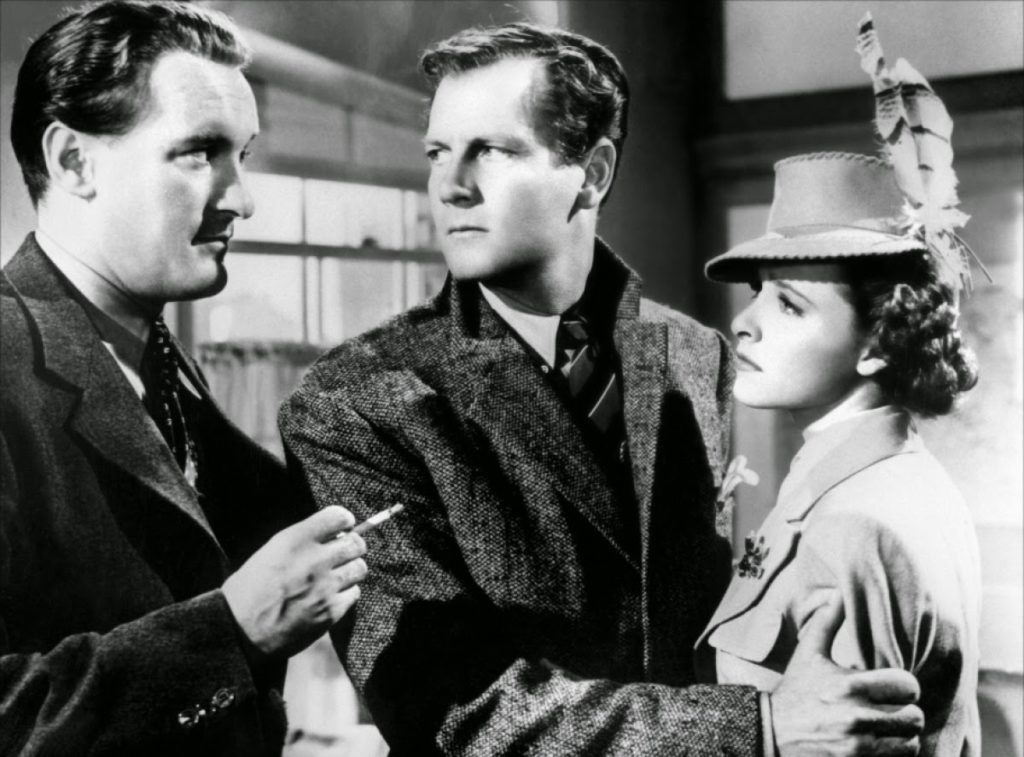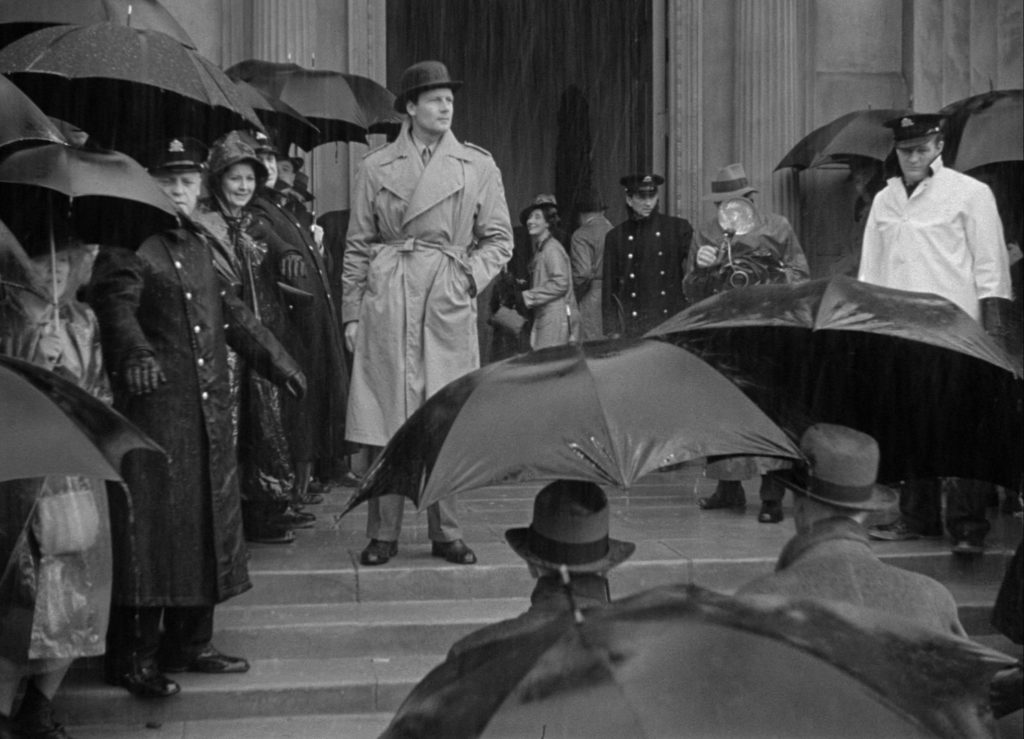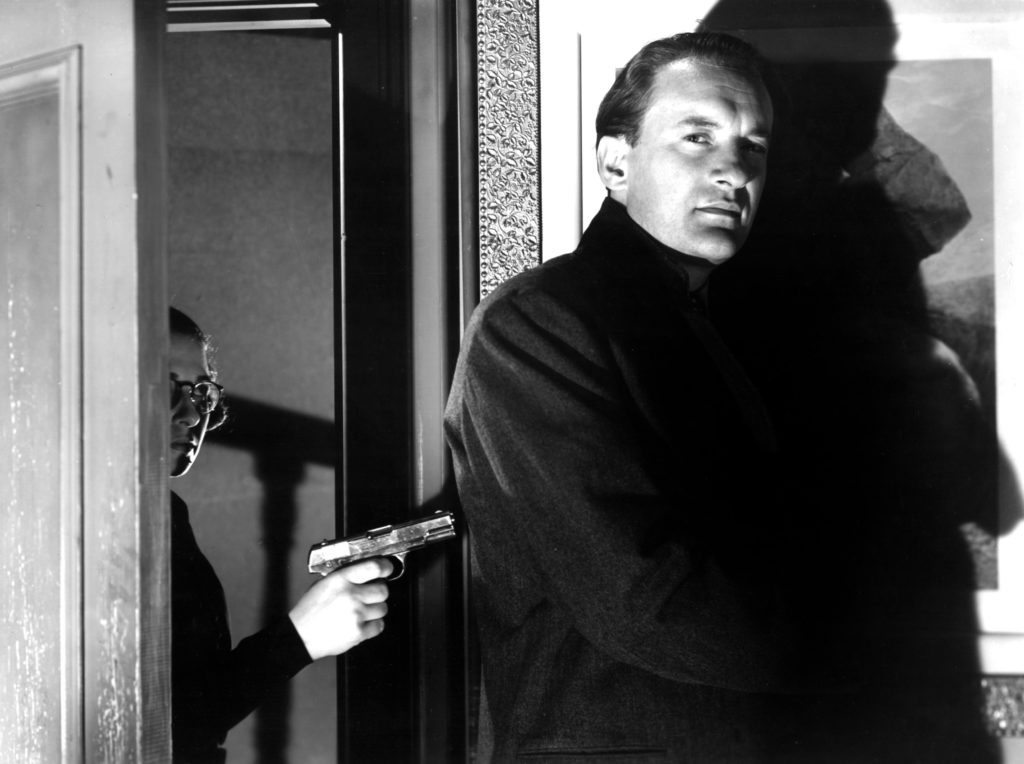The post is part of the Second Annual Alfred Hitchcock blogathon, hosted by Maddy Loves Her Classic Films. See the other posts here.
When it was released in August 1940, Foreign Correspondent was the most topical film Alfred Hitchcock had ever made. British troops had evacuated Dunkirk in May and early June. France and Norway had surrendered soon after. And the Battle of Britain had begun in July. A thriller about an American journalist unearthing a conspiracy in Europe on the eve of war might as well have been ripped from the headlines.
It’s August 1939 and none of the New York Globe’s acclaimed correspondents can answer a simple question: will there be war in Europe? Exasperated the paper’s editor, Mr. Powers (Harry Davenport), decides what he wants is “a good honest crime reporter”, someone “who doesn’t know the difference between an ‘ism’ and a kangaroo”. Enter Johnny Jones (Joel McCrea), a scrappy reporter whose very name makes him a stand-in for Middle America: Little Johnny Jones was the George M. Cohan musical that introduced ‘Yankee Doodle Dandy’ in 1904. Jones knows nothing about European politics and Powers chooses him as much for his ignorance as his curiosity. He also saddles him with a pretentious pseudonym, ‘Huntley Haverstock’—ironically making the straight-talking reporter the first in the film’s long line of characters who aren’t what they seem.
The film’s most famous scene revolves around Jones’ first assignment: the Dutch diplomat Van Meer (Albert Basserman). Jones is in Amsterdam, waiting outside a conference where the diplomat is due to speak. It’s raining. Van Meer arrives and a photographer asks for his portrait. Hitchcock’s camera glides up to the photographer’s hands, revealing a pistol held just below the camera’s flashbulb. The camera flashes, the assassin shoots Van Meer and flees and Jones chases after him, pushing his way through a thicket of umbrellas. The entire sequence happens so quickly you feel as dazed as the crowd gathered round Van Meer’s body.
Foreign Correspondent hurtles forward at breakneck speed. Hitchcock moves constantly from set piece to set piece—a windmill, a tower, a clipper over the Atlantic—in an episodic thrill ride that is also Jones’ road to enlightenment. When he first gets his assignment, Jones thinks so little of the European crisis he flippantly asks if he should interview Hitler. He quickly learns better. (Censor Joseph Breen discouraged American filmmakers from portraying Germany in a negative light, for fear of antagonising the Nazis. The enemy’s name is never spoken in Foreign Correspondent, but it’s obvious whom the villains represent.) Producer Walter Wanger believed the film should make an overt political statement and feel like a newsreel. There are dates and scraps of information everywhere and a sense of urgency as Jones’ world counts down to the inevitable. But Hitchcock also made a Hitchcock film, bringing in his own writers, Joan Harrison and Charles Bennett, to revise the script and add more humour. When Jones is forced to clamber onto a hotel’s roof to escape the villains, he accidentally breaks the sign, transforming ‘Hotel Europe’ into the thematically appropriate ‘Hot Europe’.
No one is more in tune with the film’s wit than George Sanders. Months after he appeared as the duplicitous Jack Favell in Rebecca, Hitchcock cast him again as Jones’ unflappable foil, Scott ffolliott. Yes, the lowercase double f’s are intentional. Jones first meets ffolliott when he jumps into a car to follow Van Meer’s assassin and ffolliott happens to be driving. A fellow reporter, ffolliott is the definition of sangfroid, dodging bullets while explaining his surname to a confused Jones: one of his ancestors was beheaded by King Henry VIII and his wife lowercased the f to commemorate the occasion. Sanders nonchalantly strolls the tightrope between wit and idiocy, dashing off lines in his inimitable baritone purr.
The rest of the supporting cast is strong too. Herbert Marshall is meticulously affable as Stephen Fisher, a peace advocate, handling his dialogue with a deftness that reminds you of his work with Ernst Lubitsch. Basserman invests Van Meer with great dignity and poignancy. Robert Benchley’s deadpan reporter Stebbins appears sozzled even when he’s sober and Edmund Gwenn plays a kindly, murderous bodyguard. The only disappointment is Laraine Day as Fisher’s daughter, Carol, whose character is pivotal and performance disposable.
Foreign Correspondent ends with its only scene of explicit propaganda: a clarion call to Americans written by Ben Hecht and added at the last minute when it became clear the Nazis would soon be bombing London. The film did well with audiences and critics but was released the same year as Rebecca and has been overshadowed by its moodier sibling ever since. That’s a pity because Foreign Correspondent is excellent: a witty, earnest film about a time when the world stood on the brink, and the people who fought back.



[…] Retro Movie Buff encounters spies and windmills in her review of Foreign Correspondent. […]